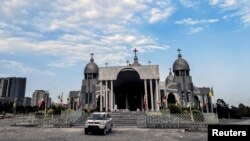The three archbishops who set up the rival body in Ethiopia's largest and most populous region of Oromia have apologized, the Church leadership said in a statement posted on Facebook late Wednesday.
"The recent problems created in the Ethiopian Orthodox Tewahedo church have been solved by face-to-face discussions," it said.
The three archbishops, who were excommunicated last month after their actions, will be reinstated, it added.
The announcement followed a meeting Wednesday brokered by Prime Minister Abiy Ahmed, who is himself from the Oromo community and had been accused of backing the rebel clergy.
"This is a strong church and we have agreed to bring back the lost sheep," Abiy said at the meeting.
The tensions in the Ethiopian Orthodox Tewahedo Church had spilled over into violence earlier this month when eight people died in attacks on a house of worship in the southern town of Shashamene, according to the Ethiopia Human Rights Commission.
"Security forces and their (civilian) collaborators used disproportionate force leaving at least eight dead by either gunshot wounds or beatings," the state-affiliated but independent body said in a statement last week.
"Beatings, intimidation, expulsion from churches, forced restriction of movement and unlawful detentions have been carried out in various areas on individuals."
The crisis had threatened the unity of the Ethiopian Church, which accounts for about 40 percent of the country's 115 million population and has been headed by Patriarch Abune Mathias for a decade.
The breakaway bishops accused the Church of discrimination and linguistic and cultural hegemony, saying congregations in Oromia are not served in their native language, claims rejected by the patriarchate.
In Wednesday's statement, the Church said it would provide resources to expand services in Oromo in Oromia and other areas of southern Ethiopia.
The Church had called for peaceful protests over the crisis last weekend, a move that saw the internet and social media briefly restricted, but they were later called off after talks with the government.
The Church had accused Abiy's administration of interfering in its affairs and making comments that effectively recognized the "illegitimate group".
Orthodox leaders have long complained of persecution, including the burning of churches several years ago, and relations with the government have been tense in the past, including over the Tigray conflict in northern Ethiopia.
Ethiopia Orthodox Settle Dissent

Ethiopia's Orthodox Christian Church, one of the oldest in the world, says a crisis that erupted after a group of rebel archbishops created their own synod has been resolved.
NAIROBI —



